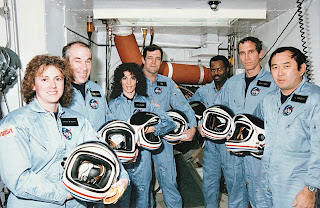Wednesday, January 29, 2014
Yesterday's Challenge
I was working in Michigan Governor Jim Blanchard’s office on January 28, 1986, the day the Challenger space shuttle exploded 73 seconds after takeoff. I don’t remember any work stoppages or tears or gatherings in the hallways or staff announcements. I just remember seeing news footage of the errant plume of smoke in the blue sky when I got home that night and liking what Ronald Reagan was quoted as saying:
"We will never forget them, nor the last time we saw them, this morning, as they prepared for their journey and waved goodbye and 'slipped the surly bonds of Earth' to 'touch the face of God.'"
I still believed in God back then and assumed that Reagan was as devastated by the accident as the rest of us. I didn’t know until recently that some people blame him for what happened to Ellison S. Onizuka, Sharon Christa McAuliffe, Greg Jarvis, Judy Resnik, Michael J. Smith, Dick Scobee and Ron McNair. (Yesterday, someone in Facebook typed, “They launched Challenger against engineers' precautionary warnings because Ronald Reagan had scheduled a ‘chat’ with 'the First Teacher in Space,' Christa McAuliffe, for television that night. Reagan killed 'em as surely as if he'd lined 'em up against a wall and shot the poor bastards.”)
Reagan was scheduled to deliver his State of the Union Address that night and may have wanted to include a live conversation with McAuliffe – a 37-year-old teacher from Concord, New Hampshire – in the speech. He ended up addressing the nation about the disaster instead and postponing his big speech until February 4.
I googled the disaster and learned that the following was the cause:
"The accident was caused by a failure in the O-rings sealing a joint on the right solid rocket booster, which allowed pressurized hot gases and eventually flame to 'blow by' the O-ring and make contact with the adjacent external tank, causing structural failure. The failure of the O-rings was attributed to a faulty design, whose performance could be too easily compromised by factors including the low temperature on the day of launch."
Because that dry, technical explanation leaves a little to be desired in the “compelling” department, I’m including the recollections of one of my closest Facebook pals, Deb Gelep, a Florida resident who witnessed the tragedy 28 years ago:
We watched the liftoff every chance we could. The utter amazement of such a monster shooting into space never failed to amaze. The night blasts were our favorite as they lit up the skies with a gold and deep red glow. This one was special to us, though – there were women involved in this adventure – and my 16-year-old daughter, Robin, was witnessing the female species exceed goals and expectations and bridge barriers. This one was more.
I was standing in our backyard with Robin watching the live liftoff, my heart racing for the unimaginable excitement of their adventure. The vapor trail behind the shiny spaceship and the sun shining on a beautiful blue-skied day was a most perfect setting. We were watching intently, heard a boom, first stage separation we thought, but the vapor trail got squiggly, and a couple trails went seemingly a little haywire, and then the vapor trail turned into a Y and we knew something was terribly wrong. I told Robin to run in and turn on the television. I was glued to the vision of that trail, hoping it would start its straight trek into the heavens again, but more things looked to be coming out of the stream and it was heading back to earth. Tears began streaming - as they are now as I recall so vividly the day we lost true adventurers.
We later sat perched together on the edge of the couch, tear stains on our cheeks, watching the reruns, waiting for an explanation, but both pretty quiet. Hopes felt frayed. We witnessed a tragic event. There have been far worse that have hurt our country and her people, of course, but that one was in my backyard.
Another Facebook commenter posted, “I still remember where I was and who I was with when we heard the news. As a kid who grew up a space flight junkie, this event really tore me up, and still bothers me today, knowing as we do now that it didn't have to happen.”
I’m always torn up when people die unnecessarily. I tell myself that everything happens for a reason, though, and maybe in this case NASA’s “flawed decision-making process” and unrealistically optimistic launch schedules wouldn’t have been disclosed if the disaster hadn’t occurred. Maybe the Challenger crew was lost in order to remind us of how precious life is. How courageous some people are. Or how, as Joni Mitchell sang back in 1970, we don’t know what we’ve got ‘til it’s gone.
Almost three decades later, I hope the Challenger heroes are resting in peace and that their loved ones derive comfort from knowing that they have not been forgotten.
Subscribe to:
Post Comments (Atom)





No comments:
Post a Comment